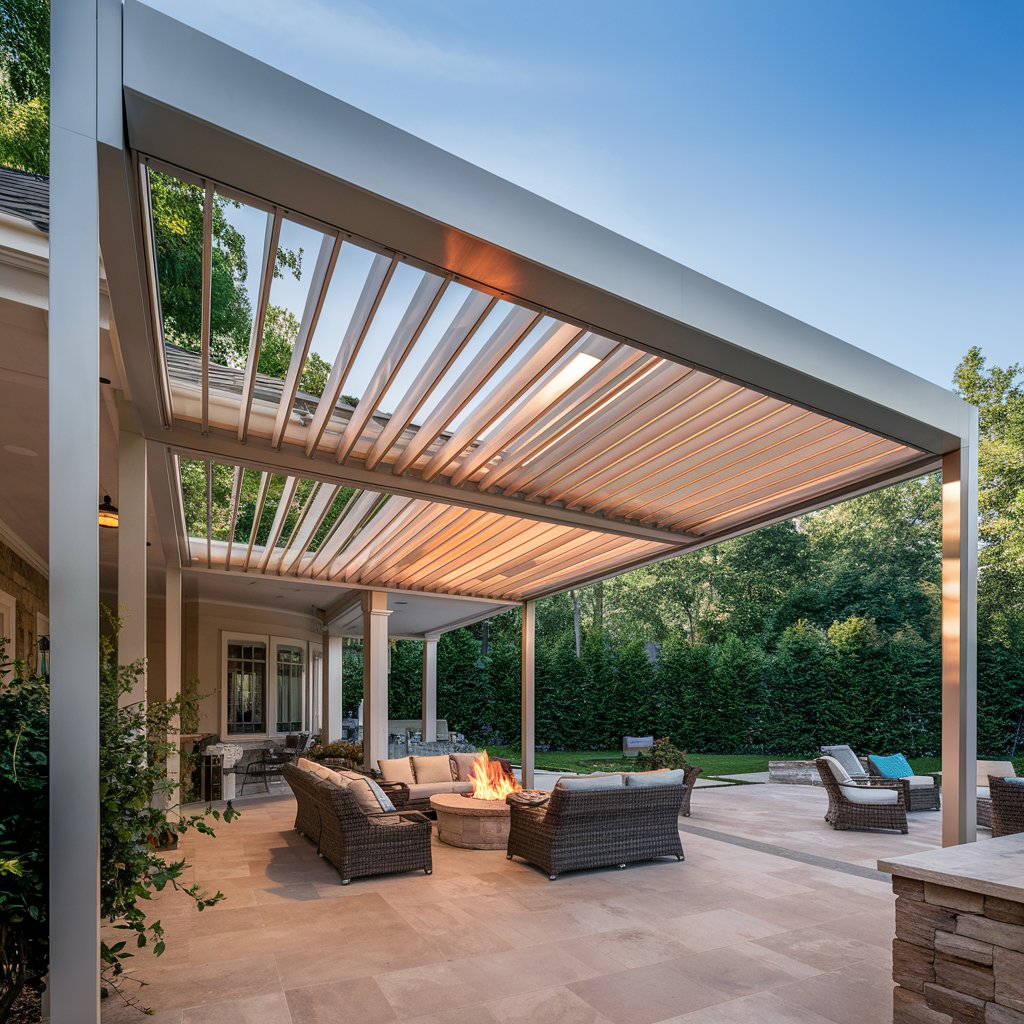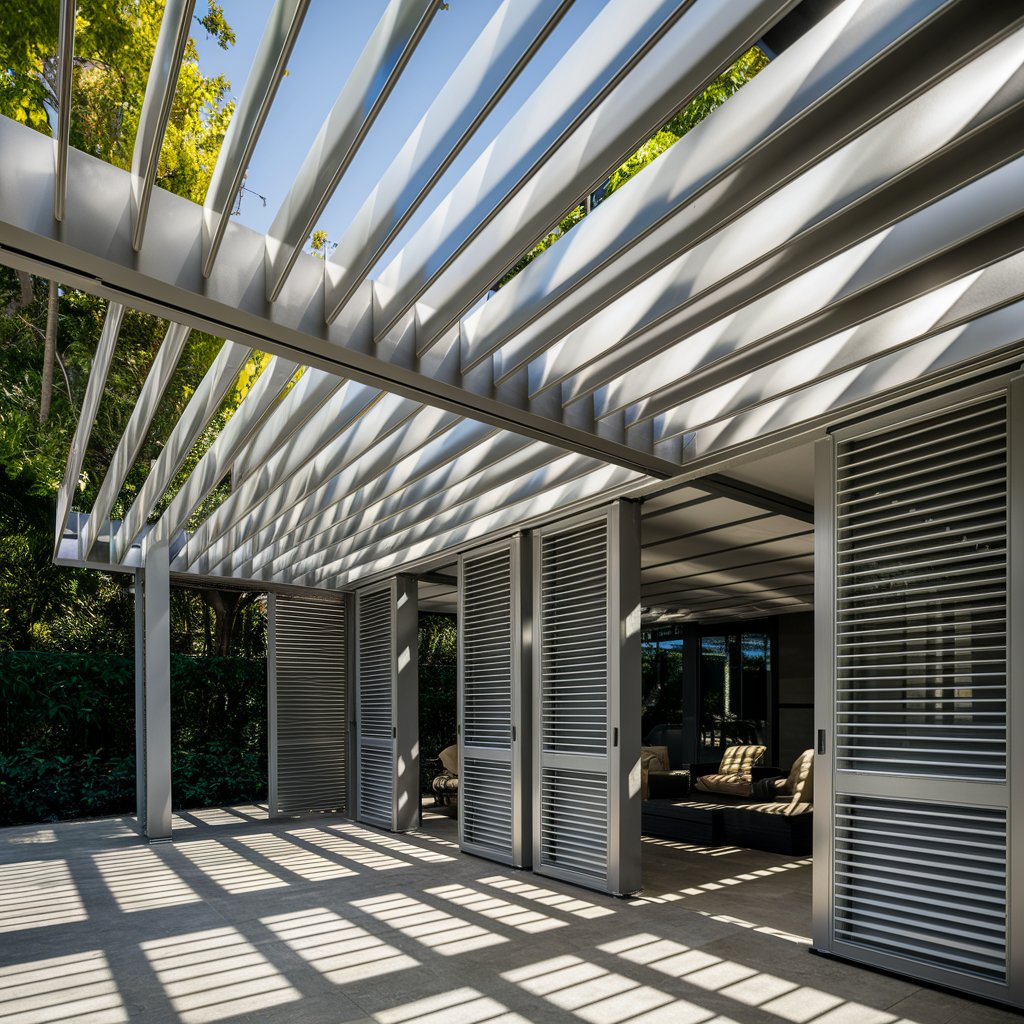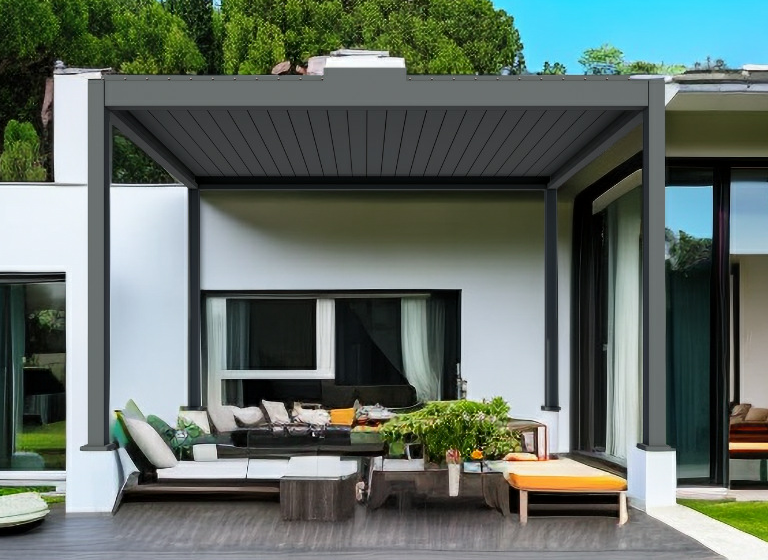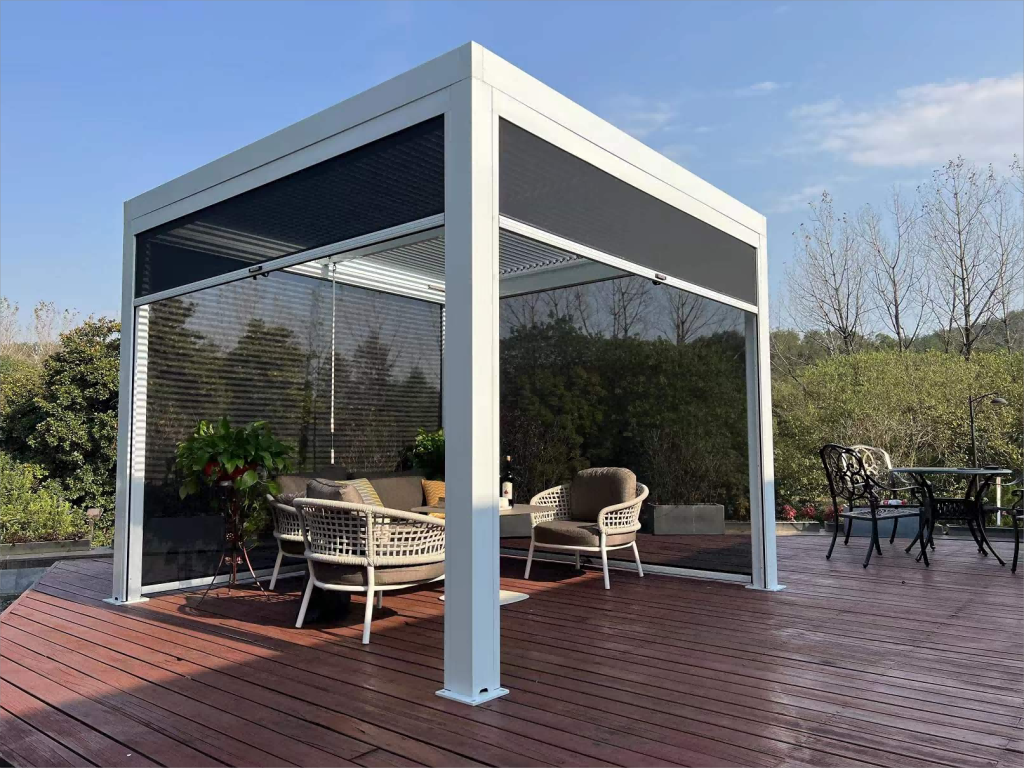The longevity of a roof louvered pergola is a significant factor for homeowners and landscape designers considering the installation of these elegant structures. A pergola not only enhances the aesthetic appeal of a home but also serves as a functional element in outdoor spaces, providing shade and a defined area for relaxation or entertainment. Because installing a pergola is a long-term investment, understanding the durability and maintenance requirements of different materials used in their construction is essential. This comprehensive guide explores the lifespan of pergolas made from various materials, their maintenance needs, and factors affecting their durability.
Importance of Pergola Longevity
A pergola’s lifespan is intrinsically linked to the overall quality and functionality of the outdoor space it enhances. Homeowners expect their investment to last, providing beauty and utility over the years without requiring excessive upkeep. The longevity of a pergola affects its cost-effectiveness, the amount of time and effort needed for maintenance, and its ability to withstand environmental stresses. Therefore, assessing the durability of a pergola’s materials is a critical step in the decision-making process.
Factors Influencing Pergola Durability
Several factors influence how long a pergola will last, including:
- Material Quality: The type of material used in constructing the pergola is the primary determinant of its lifespan. Different materials offer varying levels of durability, maintenance requirements, and resistance to environmental factors.
- Environmental Conditions: The local climate and weather patterns play a significant role in the wear and tear of a pergola. Exposure to sunlight, rain, snow, wind, and humidity can affect different materials in various ways.
- Construction Techniques: Proper construction techniques and the quality of workmanship can enhance the durability of a pergola. This includes ensuring that the pergola is securely anchored, using appropriate fasteners, and following best practices in assembly.
- Maintenance: Regular maintenance can significantly extend the lifespan of a pergola. This includes cleaning, treating, and repairing any damage promptly to prevent further deterioration.
Wooden Pergolas
Wooden pergolas are prized for their natural beauty and timeless appeal. They blend seamlessly into garden settings, offering a rustic and elegant look that is difficult to replicate with other materials. However, the longevity of wooden pergolas is limited by the inherent characteristics of wood.
Lifespan and Durability
On average, a wooden pergola can last around five years, though this can vary depending on the type of wood used, the quality of construction, and the level of maintenance. Hardwood species like cedar, redwood, and teak are more durable and resistant to decay than softwoods like pine. Treated wood, which has undergone processes to enhance its resistance to moisture and insects, can also extend the pergola’s lifespan.
Challenges and Maintenance
Despite treatments, wood remains susceptible to several issues:
- Insects and Termites: Wood is a natural material that can attract insects and termites, which can cause significant damage over time.
- Rot and Decay: Exposure to moisture can lead to wood rot and decay, compromising the structural integrity of the pergola.
- Fading and Discoloration: Sunlight can cause wood to fade and discolor, affecting the pergola’s aesthetic appeal.
- Warping and Splitting: Changes in temperature and humidity can cause wood to expand and contract, leading to warping and splitting.
To mitigate these issues, regular maintenance is required. This includes:
- Sealing and Staining: Applying a sealant or stain can protect the wood from moisture and UV damage.
- Inspecting for Damage: Regularly inspecting the pergola for signs of insect infestation, rot, or structural damage and addressing any issues promptly.
- Cleaning: Keeping the pergola clean by removing debris and periodically washing it to prevent mold and mildew growth.
Aluminum Pergolas
Aluminum pergolas represent a modern, durable alternative to wooden structures. Known for their sleek design and low maintenance requirements, aluminum pergolas are increasingly popular among homeowners looking for long-lasting outdoor solutions.

Lifespan and Durability
Aluminum pergolas are highly durable and can last over ten to twenty years, often maintaining their quality and appearance throughout their lifespan. Aluminum is resistant to rust, corrosion, and decay, making it an excellent choice for outdoor structures exposed to the elements. High-quality aluminum pergolas often undergo processes such as extrusion, spraying, and oxidation during production, which further enhance their durability. These processes ensure that the pergola’s surface is resistant to scratches, fading, and other forms of damage.
Openable Roof Systems
One of the standout features of modern aluminum pergolas is the integration of openable roof systems. These systems allow users to adjust the amount of sunlight and airflow, enhancing comfort and usability. An openable roof system typically consists of adjustable louvers that can be tilted to control the pergola’s shading and ventilation.
Roof Louver Systems
The roof louver system in aluminum pergolas is designed for both functionality and aesthetics. These louvers can be operated manually or motorized for convenience, allowing homeowners to easily adapt their outdoor space to changing weather conditions. This feature not only adds to the pergola’s versatility but also extends its lifespan by protecting the structure from excessive sun or rain when needed.
When considering the best louvered roof system for an aluminum pergola, look for systems that offer:
- Durability: Made from high-quality aluminum to resist corrosion and wear.
- Ease of Use: Motorized options with remote control for effortless operation.
- Customization: Adjustable settings to fine-tune the angle of the louvers for optimal comfort.
- Weather Resistance: Designed to withstand various weather conditions without compromising performance.
Common Issues
While aluminum pergolas are highly durable, some potential issues include:
- Thermal Expansion: Aluminum can expand and contract with temperature changes, which may cause slight movement or noise.
- Paint or Coating Wear: Over time, the paint or powder coating on aluminum can wear off, although this is usually minimal and can be addressed with touch-up paint.
Vinyl Pergolas
Vinyl pergolas are another popular choice due to their affordability, low maintenance, and clean appearance. Made from PVC (polyvinyl chloride), these pergolas offer a durable and weather-resistant option for outdoor structures.
Lifespan and Durability
Vinyl pergolas can last between ten to fifteen years, often longer with proper care. They are resistant to rot, insects, and fading, making them an excellent choice for areas with harsh weather conditions.
Advantages and Maintenance
The benefits of vinyl pergolas include
- Low Maintenance: Vinyl does not require painting, staining, or sealing. Cleaning with water and soap is usually sufficient to maintain its appearance.
- Weather Resistance: Vinyl is highly resistant to moisture, making it ideal for humid or rainy climates. It also resists fading from UV exposure.
- Affordability: Vinyl pergolas are generally more affordable than wooden or aluminum pergolas, making them an attractive option for budget-conscious homeowners.

Common Issues
Potential issues with vinyl pergolas include:
- Color Choices: Vinyl is available in fewer color options compared to other materials. However, it is often available in neutral tones that blend well with most environments.
- Strength: While durable, vinyl is not as strong as aluminum or wood and may not withstand heavy loads or impacts as well.
Steel Pergolas
Steel pergolas, particularly those made from galvanized or stainless steel, offer robust durability and a contemporary aesthetic. They are less common than wood or aluminum but provide exceptional strength and longevity.
Lifespan and Durability
Steel pergolas can last twenty years or more, depending on the type of steel used and the quality of construction. Galvanized steel is coated with a layer of zinc to prevent rust, while stainless steel offers even greater corrosion resistance.
Advantages and Maintenance
Steel pergolas offer several benefits:
- Strength: Steel provides unmatched strength and can support large spans and heavy loads, making it ideal for substantial pergola designs.
- Durability: Resistant to pests, rot, and extreme weather conditions, steel pergolas require minimal maintenance.
- Modern Aesthetic: Steel pergolas have a sleek, modern appearance that can complement contemporary outdoor spaces.
Common Issues
However, steel pergolas also have some potential drawbacks:
- Cost: Steel pergolas are generally more expensive than wood, vinyl, or aluminum options.
- Weight: Steel is heavier than other materials, which can complicate installation and may require a more robust foundation.
- Corrosion: While galvanized and stainless steel resist rust, they are not entirely immune. Regular inspection and maintenance can help prevent corrosion.
Composite Pergolas
Composite pergolas are made from a blend of wood fibers and plastic, offering the natural look of wood with enhanced durability and lower maintenance requirements. These pergolas are designed to provide the best of both worlds.
Lifespan and Durability
Composite pergolas can last between ten to twenty years, benefiting from the combined strengths of wood and plastic. They resist rot, insects, and fading better than natural wood while maintaining a similar aesthetic.
Advantages and Maintenance
The advantages of composite pergolas include:
- Aesthetic Appeal: Composite materials mimic the appearance of natural wood, offering a similar visual appeal with greater durability.
- Low Maintenance: Composite pergolas do not require staining, sealing, or painting. Regular cleaning with water and soap is typically sufficient.
- Environmental Benefits: Many composite materials are made from recycled content, making them an eco-friendly choice.
Common Issues
Potential issues with composite pergolas include:
- Cost: Composite pergolas can be more expensive than vinyl or basic wood options, though they are often more affordable than high-end wood or metal pergolas.
- Color Fading: Over time, composite materials can fade slightly, though this is usually less pronounced than with natural wood.
Conclusion
The longevity of a pergola is influenced by the material used in its construction, environmental conditions, construction techniques, and maintenance practices. Wooden pergolas offer a classic, natural appeal but require regular maintenance and have a shorter lifespan of around five years. Aluminum pergolas provide a durable, low-maintenance solution that can last over ten to twenty years, making them an excellent long-term investment. Vinyl pergolas are affordable and low-maintenance, with a lifespan of ten to fifteen years. Steel pergolas offer exceptional strength and durability, lasting twenty years or more but at a higher cost. Composite pergolas combine the visual appeal of wood with enhanced durability and lower maintenance, lasting ten to twenty years.
When choosing a pergola, considering features like an openable roof system, a roof louver system, or the best louvered roof system can significantly enhance the structure’s functionality and lifespan. Aluminum pergola systems, in particular, excel in providing durable, versatile, and aesthetically pleasing solutions that stand the test of time.



Very interesting details you have remarked, thank you
for putting up.Raise blog range